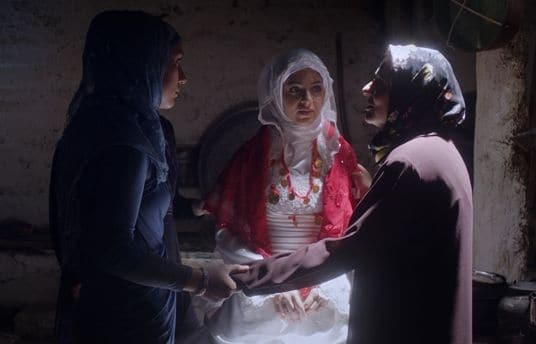 |
| Kuma |
Over the past few years there have been a number of films, prominent on the festival circuit, looking at difficult situations faced by immigrant women in Europe. Among them, Kuma is a standout, perhaps because it was developed from a very different starting point. It’s the first feature by Austrian Kurdish director Umut Dag, though one wouldn’t guess that when watching it – this kind of complex, balanced storyline usually only emerges in the work of seasoned auteurs. Umut, like many young filmmakers, is full of energy and passion for his work – yet unlike most, he has jumped in at the deep end and got away with it. We contacted him at his home in Vienna to ask how it all began.
“It was hard,” he admits. “I met Petra [Ladinigg], my co-writer, in 2008 or something like that and I pitched her a few stories. She was very into the idea of the second wife but the first thing I said was, I don’t want to make it as a first feature, I’m not grown up enough to tell this story because of all these circumstances.”
It is a challenging story. The second wife, or kuma, of the title is brought to Austria from her rural Turkish village following a fake marriage to her new husband’s son. Her real purpose is to take care of a family whose matriarch is seriously ill and whose various members all have troubles and secrets of their own. It presented Umut with a difficult decision.
“I could say okay, I’ll risk it and make the movie using all my effort and concentration to make it as good as possible, so that in a few years I can say I couldn’t do it better now even though I’m older, or the other way would be to develop another story and wait a few more years to make it. We took the risk to go with it.”
Developing the story began with developing the characters.
“For me, it was very important to give the audience the feeling every character is a human being like you and me. We thought, what are the reasons the mother took this huge, extraordinary decision to bring in a second wife, and everything we see relates to this decision. The subjects are not in the movie because we thought they would be cool but because we needed those reasons.”
Begüm Akkaya stands out for her performance as the young woman at the centre of the story, but ultimately it’s an ensemble piece. How did Umut and his team go about the difficult business of casting it?
“We searched a lot – for more than a year and a half,” he says. “It was really hard knowing that we needed people who were so good at their acting they could tell us with their souls and their eyes about the human beings behind these characters. For me, the mother character was very important. I was very lucky to find the right people.”
I ask how the film was gone down with different audiences.
“There was a split, but it was not between Turkish and Austrian audiences,” he says. “It was between the audience who watched the movie as a movie and the audience who watched the movie as a political and social statement by the filmmaker. People who interpreted it as the option of the filmmaker and making a statement about women in Islam or women in the Turkish community were very sensitive and criticised the movie very much becaue they thought it showed a bad image of that society. The other half loved it because of the deepness of the characters. I’m happy to have both opinions. For me it was never a goal to make a statement. I just wanted to tell a story and touch people’s hearts.
“I knew it would be controversial but for me it was importnt to include these subjects because it would be impossible to tell the story in a different way.” Research was key in trying to get the balance right.
“We researched a lot of the human rights organisations and female rights organisations, and talked with social workers who told us how it works,” he explains. “I read many books and I talked with my mother and other relatives from old villages in the countryside of Turkey. This was in combination with the feeling that I wanted to show every character as deeply human with universal feelings.”
Despite all this careful preparation, the success of the film took Umut by surprise. “It was more successful than I could imagine. That itt was releasd in more than 15 contries worldwide was really, for me, a very big surprise, but at same time it made me very glad to know that people liked it a lot. We trusted the subject, we trusted the movie. I hope it deserves it.”
He tells me that, whilst Kuma has been touring the festival circuit, he’s been busy shooting his next film, which is now in post production.
“We’re busy with sound mixing and sound editing, working for a release early next year. It’s the story of a father and son. The father comes out of prison when his son is 15 or 16. The son doesn’t kow who is but the father knows who the son is.”
It’s something like a crime drama, he says, with the father trying to get close to his troubled son, who is only interested in drugs and rap music, without messing things up. After Kuma, it’s likely to get a lot of attention.
Kuma is released on DVD in the UK today.





















